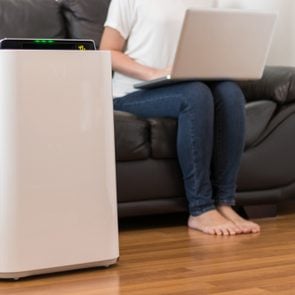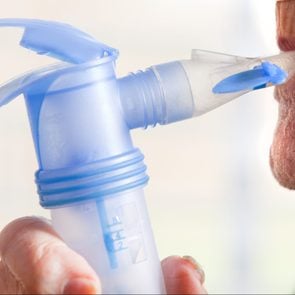6 Portable Nebulizers to Treat Asthma on the Go
Updated: Jun. 21, 2021
If you live with asthma, these portable and handheld nebulizers can make it easier to treat your symptoms while you're out or when you're traveling.
Our editors and experts handpick every product we feature. We may earn a commission from your purchases.
Portable nebulizers for on-the-go treatment
If you’re one of the estimated 25 million Americans with asthma, you’re probably always on the lookout for treatments and remedies to alleviate your symptoms.
While most people use an inhaler, the tool isn’t for everyone. An alternative way to get respiratory medication into the airways is via a nebulizer. The machine vaporizes liquid medication, which you can easily breathe into your lungs.
Nebulizers are as effective as inhalers, but there’s a downside: The machines are usually bulky and less convenient to carry. After all, an inhaler can tuck in your pocket.
Still, there are a few portable nebulizers or handheld nebulizers that you can use for travel. Here’s what to look for in a nebulizer and six portable devices that allergists recommend.
What is asthma?
Asthma is a chronic inflammatory disease of the airways that affects both children and adults.
“Patients with asthma have swelling and spasming of their airways, which can make it challenging to move air in and out of their lungs,” explains Sanjeev Jain, MD, a board-certified allergist and immunologist at Columbia Allergy.
The telltale airway constriction can make it hard to breathe, hence symptoms like wheezing, coughing, shortness of breath, and tightness in the chest. Or, as some people tell it, the feeling of breathing through a straw.
There’s a range of potential asthma triggers, including allergies, upper respiratory infections like the common cold, exercise, and cold air, Dr. Jain says.
Why is asthma so dangerous?
Despite medical treatments that help prevent and manage asthma attacks, the condition carries some serious risks.
In fact, approximately one in 10 Americans dies of asthma each day, according to the Asthma and Allergy Foundation of America. So proper care is paramount.
“Severe swelling and spasming of the airways during an asthma flare can lead to a reduced ability to move air in and out of the lungs,” says Dr. Jain.
You probably don’t need a medical expert to tell you just how essential that function is for living.
“Asthma is a chronic—lifelong—condition, so it is very important to [continually] monitor and manage your asthma,” he says.
How can a nebulizer help treat asthma?
People with asthma use medication for long-term control (thus preventing flare-ups) and quick relief during asthma attacks. Many use an inhaler to get the medication to their lungs.
But inhalers aren’t for everyone, says Shahzad Mustafa, MD, an allergist, professor of medicine at the University of Rochester Medical Center, and spokesperson for the American College of Allergy, Asthma, and Immunology.
“Although most patients can adequately administer their asthma medications through inhalers, nebulizers can be helpful for young children, older individuals who have trouble with proper inhaler technique, and sometimes individuals experiencing an asthma exacerbation, since proper inhaler technique may be difficult when someone is feeling poorly,” he explains.
If that sounds like you, your doctor may recommend a nebulizer.
Other reasons your doctor might prescribe a nebulizer: you have one of several other respiratory conditions, like chronic obstructive pulmonary disease (COPD), chronic bronchitis, emphysema, the flu, and other viruses—even Covid-19.
What to look for in a nebulizer
Here’s a close look at the features you should seek out in a nebulizer, especially if you intend to use it away from home.
Portability
People who spend the majority of their time in the home can probably make do with a nebulizer that needs to be plugged in. But children and adults who are often on the go will benefit from a nebulizer that can be used anywhere.
“If you are instructed to use your nebulized medication during an exacerbation [asthma attack], it would be beneficial to carry the device and several vials of the medication with you at all times in case of an emergency, just as you would your rescue inhaler,” Dr. Jain says.
Nebulizers that need to be plugged in aren’t going to cut it in those instances.
“In these situations, a smaller, battery-powered nebulizer would be preferred to a device that needs to be plugged in to use,” he says.
Insurance coverage
If you need a nebulizer, chances are your doctor will send in a prescription for the device when prescribing the liquid respiratory medication.
First, look up which nebulizer devices are approved by your health insurance provider, Dr. Jain says. That way, the company can cover at least part of the cost. Depending on your insurer, the entire cost of the device may be covered.
Medication compatibility
“If you choose not to go through insurance, you will want to ensure the device you pick can deliver the medication you were prescribed,” says Dr. Jain.
He gives the example of budesonide, an inhaled corticosteroid used to reduce airway inflammation. If your doctor prescribed this for your asthma, you wouldn’t want to buy an ultrasonic nebulizer. That type is unable to deliver medications that come in a liquid suspension, like budesonide.
Ease of use
The nebulizer you choose must be one that you can use without trouble. You may not get all of your required medication if you don’t use it properly.
The device should also be easy to clean. If dust, mold, and bacteria collect within the device, using it can increase the risk of respiratory infection and further asthma symptoms, warns Dr. Jain.
Extended battery life
When seeking out a nebulizer that is useful for travel, make sure that it has good battery life. It’ll need to last you your entire trip out of the house.
“It is crucial that the entire dose of the medication is delivered to the patient, so you do not want a battery to die part way through the treatment,” says Dr. Jain.
Some devices use traditional AA batteries, while others are rechargeable. Dr. Jain recommends those that use traditional batteries so you can easily swap them out should they die during treatment.
(This is how asthma and allergies are linked.)
The best portable and handheld nebulizers for travel
Ready to shop? Here are six allergist-recommended portable and handheld nebulizers.
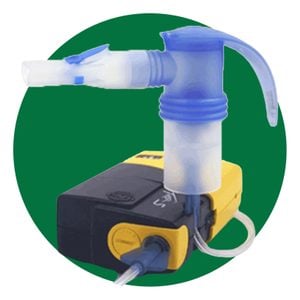
Pari Trek S Portable Nebulizer
Though more expensive than other portable nebulizers on the market, this Pari Trek portable nebulizer is one Dr. Jain recommends to patients who plan to travel.
“This device is easy to use, delivers medication in about five minutes, can be used with most medications, and contains a rechargeable battery with a 50-minute battery life,” he says.
The device is easy to find (it’s sold at Walgreens), so you can pick one up when you hit the pharmacy for your medication.
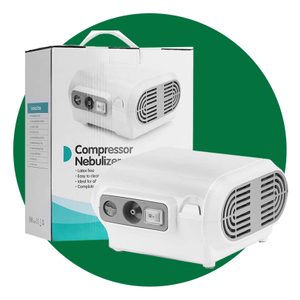
Tangxia Traditional Jet Nebulizer
This Tangxia nebulizer is a much more affordable option than most. It is portable and comes with a traditional compressor that uses air power to turn the medication into a breathable mist in a process that takes less than 10 minutes. To recharge it, you can simply plug it into the wall.
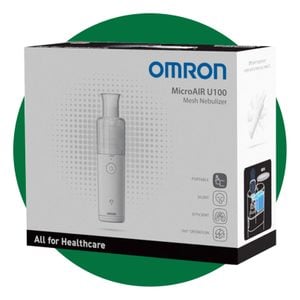
Omron Portable MicroAir U100 Nebulizer
This ultrasonic nebulizer from Omron operates on two AA batteries for up to four hours or plugged in with an AC adapter, which is one reason why Dr. Jain recommends it to patients looking for a portable option.
“This device comes with a child mask and a mouthpiece for adults or older children and is easy to clean,” he says. “Because this is ultrasonic, this device is not ideal for suspension medications like budesonide.”
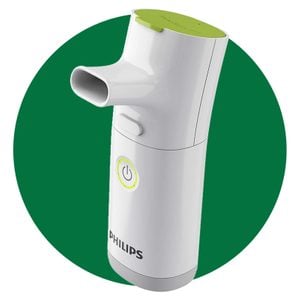
Phillips Respironics InnoSpire Go Portable Mesh Nebulizer Kit
With a built-in battery life that extends up to 120 minutes, it’s clear to see why Dr. Jain recommends this Philips nebulizer to patients who are looking for a handheld nebulizer that’s ideal for travel.
“It is easy to assemble, is easy to clean, and delivers medications in as little as four minutes,” he says.
It features the same vibrating mesh technology used in hospitals and can be used with the most commonly prescribed respiratory medications. Plus, it’s sleek and small, so it’s easy to carry and stash nearby.
(Try these exercises to build stronger lungs.)
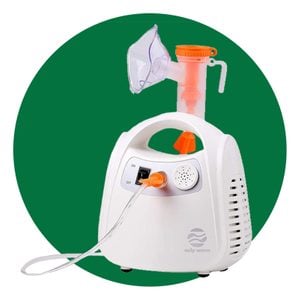
Only Warm Portable Nebulizer
This is a great nebulizer for all ages—even infants. Only Warm‘s device comes with all of the necessary accessories, including a mask for adults and children and a mouthpiece.
Though it’s not as small as other portable nebulizers on the market, it is still a convenient size for travel. The only catch is that it requires an outlet for charging.
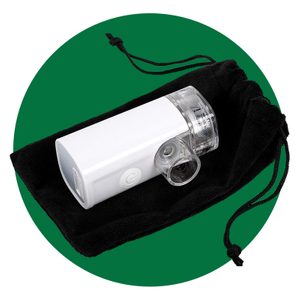
Wizard Research Laboratories Nebulizer Wizard
This nebulizer from Wizard Research Laboratories uses mesh technology to turn liquid medicine into aerosolized particles that you can breathe in.
It comes with all of the accessories you need, including an adult mask and child mask, mouthpiece, USB wall charger, retractable charging wire, and even a travel pouch, which is convenient for long trips.
Now that you know about these portable nebulizers, check out 11 healthy lung foods to add to your diet.

